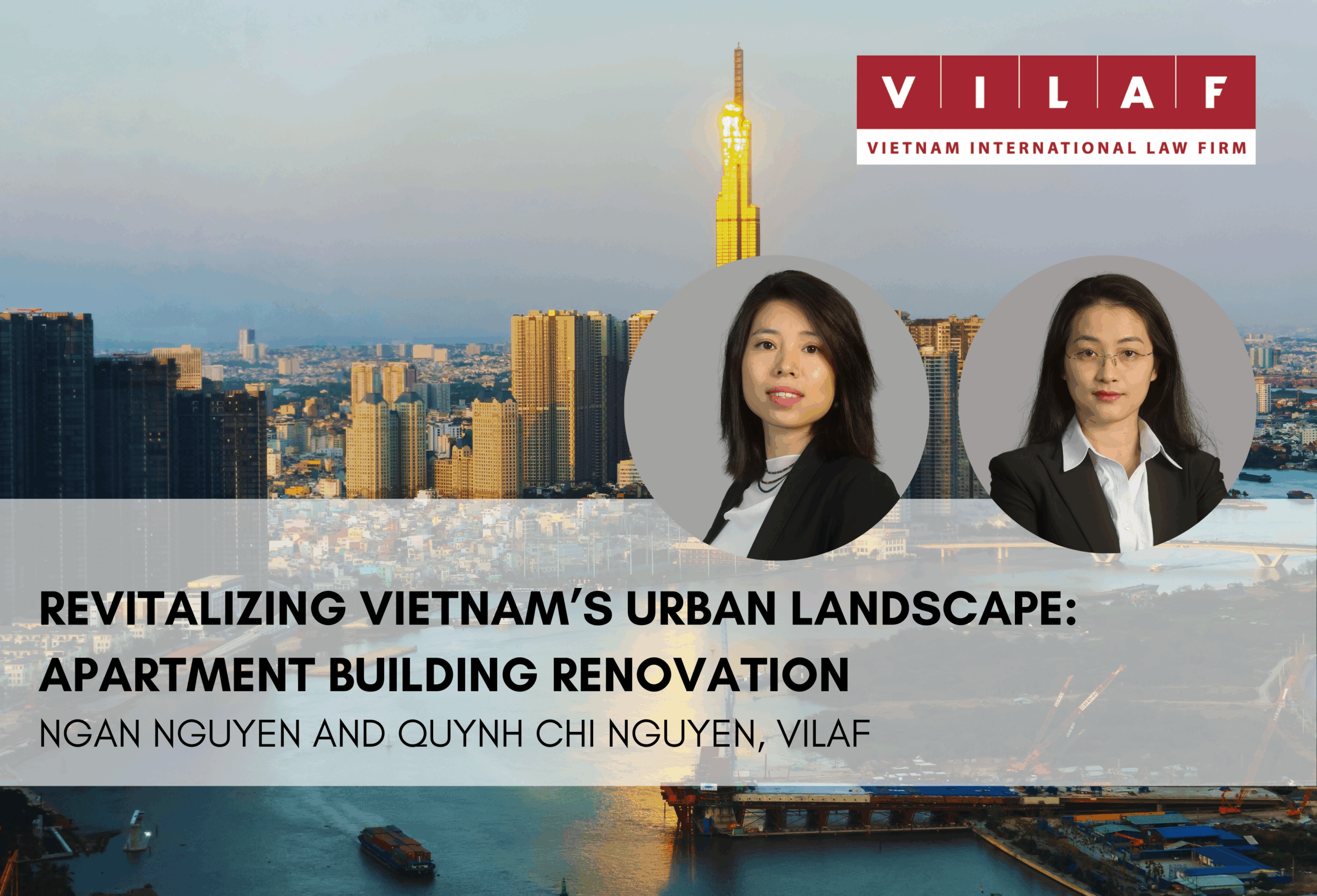
Written by Partner Ngan Nguyen and Associate Quynh Chi Nguyen
The Opportunity and Legal Framework
Vietnam is entering a new phase of urban renewal, with over 2,500 aging apartment buildings identified for renovation or reconstruction. Major cities such as Hanoi, Ho Chi Minh City, and Da Nang are leading efforts to modernize deteriorating housing stock, offering a compelling opportunity for real estate investors and developers.
To support this transformation, the Vietnamese government has introduced a robust legal framework through the Law on Housing 2024, Decree No. 98/2024/ND-CP, and its amendments (Decree No. 178/2025/ND-CP and Decree No. 140/2025/ND-CP). These regulations provide:
- Clear criteria for identifying buildings subject to mandatory demolition.
- Defined procedures for investor selection and project approval.
- Attractive incentives to reduce financial burdens and enhance project feasibility.
Buildings may be demolished if they have reached the end of their lifespan, suffered structural damage, or are located in zones designated for redevelopment. Local authorities conduct biannual inspections to assess building conditions and initiate necessary actions.
Investment Process and Incentives
Step-by-Step Redevelopment Process:
Investors can engage in renovation projects through a structured agreement with apartment owners. The redevelopment process is carried out in the following steps:
- Public Announcement: Provincial housing agencies announce eligible projects.
- Investor Registration: Interested developers submit qualifications and compensation plans.
- Resident Consultation: Apartment owners vote on investor selection (75% approval required).
- Policy Approval: The selected investor submits documents for investment policy approval.
- Project Execution: Upon approval, land is reclaimed and redevelopment begins.
Incentives for Developers:
Vietnam offers a robust package of incentives to attract investment:
- Land Use Fee Exemptions: No fees for land allocated within the project scope.
- Flexible Land Use Ratios: Additional land use is permitted with financial obligations.
- Off-Site Resettlement Options: If residents relocate elsewhere, investors are allowed to sell the housing area of those residents and still enjoy the exemption of land use fees/rentals.
- Commercial Sales: Developers can sell surplus units at market prices without land use fees.
- Support for Infrastructure Costs: Local budgets may cover up to 50% of technical infrastructure and relocation costs.
- Access to Financial Resources: Investors may borrow from land development funds and utilize presales for financing.
- Tax and Credit Incentives: Additional benefits are available under national and provincial policies.
City-Level Initiatives and Regional Inspiration
Hanoi’s Strategic Approach
Hanoi is prioritizing the redevelopment of four major complexes: Kim Lien, Trung Tu, Khuong Thuong, and Hao Nam. Furthermore, the Hanoi People’s Committee is currently seeking public feedback on a draft Resolution by the City People’s Council, which outlines compensation, support, and resettlement policies for urban renovation and the reconstruction of old apartment buildings.
A draft resolution by the Hanoi People’s Council, which is expected to be submitted for approval during the September 2025 session of the City Council, proposes:
- Maximum compensation for homeowners.
- Fair benefit-sharing mechanisms.
- Preservation of cultural and architectural heritage.
- Community engagement and environmental sustainability.
Ho Chi Minh City’s Ambitious Goals
By 2035, Ho Chi Minh City aims to renovate all apartment buildings built before 1975 and upgrade those constructed between 1975 and 1994. The city is currently drafting a Resolution to introduce additional incentives and support mechanisms for investors participating in these redevelopment projects. The city’s master plan will include:
- 50% support for infrastructure and relocation costs (up to 10 billion VND/project).
- Full coverage of project appraisal fees.
- Additional incentives under a forthcoming city resolution.
Lessons from Singapore: Government-Led Urban Renewal Models
Vietnam’s approach to apartment building renovation draws valuable insights from Singapore’s experience in reviving aging housing estates. Two key programs: the Selective En bloc Redevelopment Scheme (SERS) and the Voluntary Early Redevelopment Scheme (VERS), offer instructive models for balancing redevelopment goals with resident welfare.
SERS: A Proactive Government-Led Model
Launched in 1995, SERS is a government-initiated program modeled after private-sector en bloc sales. Unlike private transactions, where residents may choose whether to sell, SERS mandates relocation. The government acquires aging blocks, demolishes them, and replaces them with higher-density developments.
Key features include:
- Compensation and Relocation: Affected homeowners receive monetary compensation and are offered new flats nearby, typically with a fresh 99-year lease.
- Community Continuity: Residents can remain within their familiar neighborhoods, preserving social ties while upgrading their living conditions.
- Urban Renewal: The scheme injects new life into old estates, attracting younger families and supporting long-term urban sustainability.
While SERS has modernized many estates, it has faced criticism over:
- The adequacy of compensation.
- Financial losses for some owners.
- Disruption caused by forced relocation.
These challenges emphasize the importance of transparent planning, fair compensation, and community engagement which principles now reflected in Vietnam’s evolving legal framework.
VERS: A Voluntary, Resident-Driven Alternative
Introduced in 2018, VERS offers a more flexible approach. It targets flats that are at least 70 years old, allowing residents to vote on whether to accept a government buyback offer. If a majority agrees, the estate is redeveloped before leases expire.
Key distinctions:
- Voluntary Participation: Residents have agency in deciding whether to redevelop.
- Broader Reach: More households can potentially benefit, especially in older estates.
- Lower Compensation: Compared to SERS, VERS offers less generous financial terms due to the lower redevelopment value of aging flats.
Though still in its early stages, VERS reflects a shift toward inclusive and participatory urban renewal, aligning with Vietnam’s emphasis on stakeholder consultation and benefit-sharing.
A Call to Action
Vietnam’s apartment building renovation sector presents a high-potential investment opportunity. With a more supportive legal framework, generous incentives, and proactive city-level planning, developers and investors are well-positioned to contribute to and benefit from Vietnam’s urban renewal.
